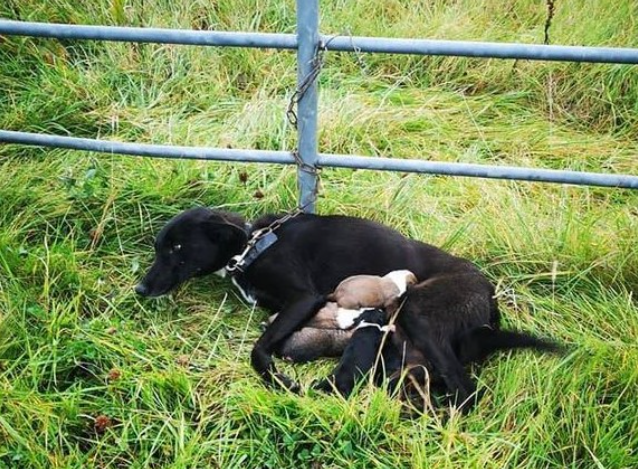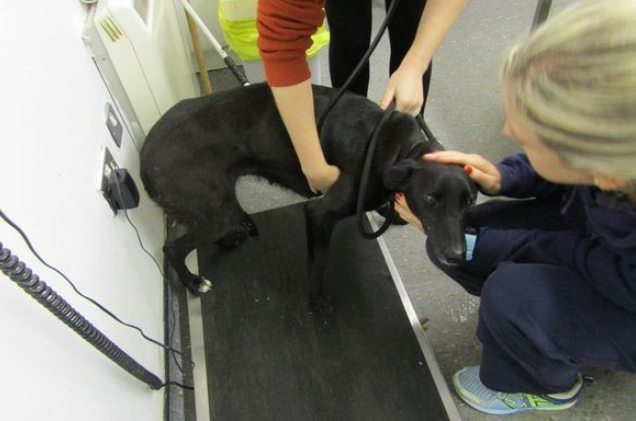In a quiet, isolated corner of the countryside, a heartbreaking discovery unfolded into a story that would later inspire countless people. There, in the stillness of an open field, a two-year-old lurcher was found chained tightly to a cold metal fence post. Lurchers are known for their gentle nature, their loyalty, and their elegant speed, but this young mother had been reduced to stillness. The heavy chain allowed her barely a few inches of movement, anchoring her helplessly to the ground. Yet the most painful part of the scene wasn’t her restraint—it was what lay beside her. Six newborn puppies, tiny and fragile, huddled together on the hard earth, trying desperately to stay warm. Their eyes had not yet opened to the world, and their faint cries rose and fell like soft whispers carried by the wind. With no food, no water, and no shelter from the cold, their chances of survival appeared heartbreakingly slim.

And still, even in such desperate circumstances, the mother dog held fast to her instinct: protect her babies. Though trapped and weakened, she struggled to curl her body enough to let her puppies nurse. Every small movement was an effort, but she never stopped trying. She pressed close to them, offering what warmth she could, her entire being focused on one purpose—keep her little ones alive. Her devotion, pure and unwavering, was the one thing standing between life and loss.
No one knows exactly how long she had been there. Rescuers later believed she had likely given birth only shortly before being abandoned. According to a report in the Daily Mail, the dogs were probably left soon after delivery, without any consideration for their fragile state. In that lonely field, exposed to the cold and silence, the mother and her puppies endured as best they could, clinging to hope in the only way they knew—by holding onto each other.

When they were finally discovered, the people who found them acted immediately. Help was called, and soon the mother and her six newborns were transported to the Irish Society for the Prevention of Cruelty to Animals (ISPCA) national facility in County Longford. The staff, trained in both emergency care and gentle handling, stepped in at once. Each puppy was examined carefully, checked for dehydration, weakness, and signs of exposure. The mother was assessed as well, her body inspected for injuries caused by the heavy chain or the cold ground.
The news that followed felt nothing short of extraordinary. Despite everything they had been through, all seven dogs were in good health. Their survival was a testament to the mother’s determination and the speed of the rescue that followed. For the workers at the ISPCA, it was a powerful reminder of why they do what they do. Even when circumstances seem bleak, compassion can step in and alter the outcome.

The six puppies, whose personalities were just beginning to emerge, were given names that carried a touch of Americana and warmth—Billy Ray, Dixie, Dolly, Dotty, June, and Patsy. Today, they are safe, well-fed, and wrapped in care at the ISPCA, where they will stay until they are old enough to be adopted into loving homes. Their days now are filled with warmth instead of cold earth, gentle hands instead of harsh neglect, and the promise of lives filled with affection.
Their mother, too, is receiving the kindness she deserves. No longer bound by chains, she now moves freely, rests on clean bedding, and is greeted with soothing voices and patient care. The ISPCA has encountered countless cases of abandonment, yet the resilience of this young mother stands apart. Her strength, even in her most vulnerable moment, speaks to the remarkable will of animals to protect their young no matter the odds.
Beyond the rescue itself, the ISPCA emphasized the broader issue that stories like this highlight: the ongoing struggle shelters face as the number of unwanted animals continues to rise. Many organizations operate at full capacity, and one of the most effective solutions remains the routine spaying and neutering of pets. By encouraging responsible pet care, communities can reduce the number of litters born into uncertainty. When pet owners take these steps, it prevents countless animals from ending up in dangerous or neglectful situations like the one this mother and her puppies endured.

Animal welfare groups across the globe echo this message. Their work extends far beyond rescue missions. They educate, advocate, and remind people that every animal deserves dignity, safety, and a chance at a good life. By sharing stories like this one, they hope to reach families considering a new pet, encouraging them to adopt rather than purchase, and to prepare for the lifelong commitment that animal care requires.
For the mother lurcher and her puppies, their story has shifted from despair to hope. They have moved from a cold, unforgiving field to a warm and caring environment where their future is being rebuilt day by day. Soon, the puppies will be ready to go to new homes, where they will be loved, protected, and cherished. Their mother will also find her forever home—a place where she will never again feel the weight of a chain or the fear of abandonment.
Stories like these remind us of the profound impact that kindness can have. They shine a light on the bond between a mother and her children, a bond so powerful it can endure hardship and still emerge with hope. And they remind us of the essential role that animal welfare organizations play in giving vulnerable animals a second chance at the life they deserve.





